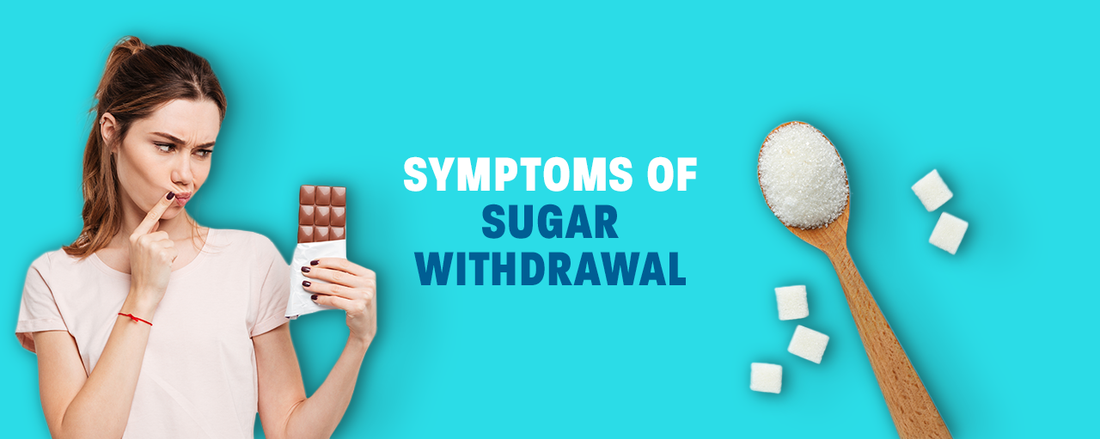
Suikerontwenning: welke symptomen kunnen optreden?
Welke symptomen komen voor bij suikerontwenning en wat kun je eraan doen?
Te veel suiker is ongezond, veroorzaakt fysieke en psychische afhankelijkheid en kan leiden tot onaangename klachten: de lijst met redenen waarom we suiker zouden moeten vermijden is lang. Toch is het natuurlijk moeilijk om snoep, chocolade en andere gezoete voedingsmiddelen volledig uit ons dieet te bannen. Wie suiker durft te laten staan, kampt echter vaak met ontwenningsverschijnselen. Dit komt doordat ons lichaam met verschillende klachten kan reageren op suikerontwenning.
We leggen uit welke bijwerkingen het stoppen met suiker kan hebben, hoe lang de ontwenningsverschijnselen duren en welke tips je kunnen helpen om te blijven stoppen met suiker.
[[Veelgestelde vragen]]
[ITEM-]
[Q-]Hoe lang duurt het voordat je last hebt van suikerontwenning? [-Q]
[A-] Zodra het lichaam gewend is aan het niet meer consumeren van suiker, verdwijnen de symptomen. Er is echter geen algemeen antwoord op de vraag hoe lang de suikerontwenning duurt, aangezien dit van persoon tot persoon verschilt. De eerste positieve effecten van het niet meer consumeren van suiker worden meestal na ongeveer een week merkbaar. [-A]
[-ITEM]
[ITEM-]
[Q-]Hoe ga ik om met suikerontwenning? [-Q]
[A-] Om de ontwenning van suiker te weerstaan, moet u voldoende gezonde voeding eten om de bloedsuikerspiegel stabiel te houden, voldoende vocht drinken, regelmatig bewegen, voldoende slapen en uzelf afleiden van gedachten aan suikerhoudend voedsel. [-A]
[-ITEM]
[ITEM-]
[Q-]Wat gebeurt er als je plotseling stopt met het eten van suiker?[-Q]
[A-] Elk lichaam reageert anders op suikerontwenning. Sommige mensen reageren met fysieke en psychologische symptomen op suikerontwenning, terwijl anderen vrijwel niets merken van het stoppen met suiker. Typische ontwenningsverschijnselen zijn onder andere hunkering naar suiker, hoofdpijn, vermoeidheid, psychologische effecten en nog veel meer. [-A]
[-ITEM]
[ITEM-]
[Q-]Wat is het effect van het opgeven van suiker op het lichaam?[-Q]
[A-] Iedereen die de strijd aangaat tegen suikerverslaving kan op de lange termijn positieve veranderingen verwachten: het opgeven van suiker kan de vetgehaltes in de lever en het bloed verbeteren, ontstekingen verminderen en leiden tot een beter algemeen gevoel. [-A]
[-ITEM]
[[-Veelgestelde vragen]]
Heeft het stoppen met suiker invloed op het lichaam?
Het is inmiddels algemeen bekend dat te veel suiker ongezond is en dat een hoge suikerconsumptie zelfs kan leiden tot suikerverslaving . Dus wat gebeurt er als we stoppen met het eten van suiker? Treeden ontwenningsverschijnselen echt op zonder suiker en wat gebeurt er met het lichaam als we suiker definitief opgeven ? Iedereen die de strijd aangaat tegen suikerverslaving kan op de lange termijn positieve veranderingen verwachten : het opgeven van suiker kan de vetwaarden in de lever en het bloed verbeteren, ontstekingen verminderen en leiden tot een beter algemeen gevoel. [$1] Maar zoals bij elke verslaving is het opgeven van suiker in het begin niet gemakkelijk .
Zolang je regelmatig suiker eet, zal je lichaam meer suiker nodig hebben. Dit geldt niet alleen direct na het eten van chocolade, maar ook dagen en misschien wel weken later. Als je besluit om suiker te laten staan, zal je lichaam in eerste instantie protesteren en hoogstwaarschijnlijk reageren op de suikerontwenning met fysieke en psychische bijwerkingen . [$2]
Suikerontwenning: welke symptomen kunnen optreden?
Het belangrijkste om te weten is dat elk lichaam anders reageert op suikerontwenning . Als je van plan bent om te stoppen met suiker, hoef je je niet al te veel zorgen te maken over mogelijke ontwenningsverschijnselen. Sommige mensen reageren op suikerontwenning met fysieke en psychische klachten , terwijl anderen er vrijwel niets van merken. Uiteindelijk moet je het gewoon zelf uitproberen. Mocht je echter ontwenningsverschijnselen ervaren wanneer je stopt met suiker, dan zijn er enkele typische symptomen die gepaard gaan met suikerontwenning.
Hunkering naar zoetigheid
Een van de eerste symptomen van suikerontwenning is een hunkering naar zoetigheid . Als je voorheen regelmatig snoep, chocolade, enkelvoudige koolhydraten en suikerhoudende voedingsmiddelen en dranken consumeerde, zal het radicaal stoppen met suiker leiden tot een sterke hunkering naar suiker . Dit maakt het in het begin natuurlijk extra moeilijk om suiker te laten staan, maar het lichaam zal geleidelijk aan de ontwenning wennen.
Hoofdpijn door suikerontwenning
Naast hunkering naar suiker als reactie op suikerontwenning, is hoofdpijn ook een veelvoorkomend symptoom. Dit is simpelweg een reactie op de suikerontwenning en de verandering in energievoorziening door de verandering in voeding . Na een paar dagen went het lichaam meestal aan het niet meer eten van suiker en verdwijnen de hoofdpijnen.
Suikerontwenning kan leiden tot duizeligheid en problemen met de bloedsomloop
Het advies om mensen met problemen met de bloedsomloop en duizeligheid iets zoets te geven, zoals cola of chocolade, is nog steeds bekend. Suiker zorgt ervoor dat de bloedsuikerspiegel omhoog schiet en kan problemen met de bloedsomloop tegengaan door hypoglykemie te veroorzaken. Om deze reden kan suikerontwenning ook leiden tot duizeligheid en problemen met de bloedsomloop . [$3] Omdat de normale suikerinname niet meer beschikbaar is, daalt de bloedsuikerspiegel . Het lichaam moet hier eerst aan wennen.
Suikerontwenning en vermoeidheid
Niet alleen hoofdpijn en trek, maar ook vermoeidheid en gebrek aan motivatie maken het stoppen met suiker bijzonder moeilijk, vooral in het begin. Iedereen die zichzelf voorheen de hele dag door een suikerpiek bezorgde met snoep, suikerhoudende voedingsmiddelen of zoete dranken, zal deze motivatie na de suikerontwenning moeten missen. Als suiker niet meer als stimulerend middel en energieboost aanwezig is , kunt u zich in het begin moe voelen totdat uw lichaam gewend is aan uw nieuwe leven zonder suiker .
Spijsverteringsproblemen veroorzaakt door suikeronthouding
Omdat suiker ook de darmflora beïnvloedt, kan suikerontwenning leiden tot buikpijn , een opgeblazen gevoel of misselijkheid . [$4] Afhankelijk van hoezeer u uw dieet verandert door te stoppen met suiker, kunnen deze symptomen in verschillende mate van ernst optreden. Natuurlijk hoeft suikerontwenning niet per se tot dergelijke ontwenningsverschijnselen te leiden.
Onzuivere huid door suikerontwenning
Een hoge suikerconsumptie wordt vaak geassocieerd met huidproblemen en puistjes . [$5] Maar zelfs wanneer u begint met het stoppen met suiker, kan uw huid hierop reageren . In de eerste paar dagen en weken kan suikerontwenning leiden tot puistjes en een onzuivere huid . Net als alle andere symptomen van het stoppen met suiker, zullen deze waarschijnlijk na verloop van tijd verdwijnen.
[[PRODUCTEN-]]chunky-smaak,zerup-zero-siroop[[-PRODUCTEN]]
Het vermijden van suiker kan slaapstoornissen veroorzaken
Suikerontwenning kan zich niet alleen uiten in lichamelijke bijwerkingen, maar kan ook je slaap beïnvloeden. Daar zijn verschillende redenen voor. Enerzijds kan de hunkering naar zoetigheid er natuurlijk voor zorgen dat je moeite hebt om suiker te laten staan, vooral 's avonds. Dwalen je gedachten af naar de sterke drank? Het missen van een reep chocolade of andere suikerrijke voedingsmiddelen kan je slaap bederven.
Omdat suiker ook invloed heeft op je hormoonspiegels en je hersenen , kun je last krijgen van klachten als hoofdpijn en slaapstoornissen totdat je gewend bent aan een leven zonder suiker.
Suikerontwenning heeft psychologische effecten
Suiker kan niet alleen leiden tot fysieke afhankelijkheid, maar ook tot psychische afhankelijkheid . Het is dan ook geen wonder dat suikerontwenning ook psychische gevolgen heeft. Stemmingswisselingen, prikkelbaarheid en concentratieproblemen behoren tot de meest voorkomende psychische problemen bij het stoppen met suiker. Daar zijn verschillende redenen voor. Aan de ene kant is stoppen natuurlijk nooit makkelijk en iedereen die ooit een dieet heeft gevolgd, kent de chagrijnigheid die daarmee gepaard gaat. Het is dus niet verwonderlijk dat je in een slecht humeur raakt als je de chocolade waar je zo dol op was, moet laten staan. Als snoepgoed nog steeds deel uitmaakt van het dagelijks leven in je omgeving, terwijl je het aandurft om "cold turkey" te stoppen, verbetert dat je humeur ook niet per se.
Een andere reden voor de emotionele impact van het stoppen met suiker is dat suiker vaak wordt gebruikt als stemmingsverbeteraar of troostmiddel . Wanneer we gestrest, verdrietig of gefrustreerd zijn, grijpen we vaak naar onze favoriete snoepjes. De suiker verhoogt de serotoninespiegel en we voelen ons meteen beter. Daarom is suikerverslaving voor veel mensen ook een psychologisch probleem. Omdat dit door suikerontwenning niet meer werkt, is het goed mogelijk dat je, vooral in het begin, last krijgt van stemmingswisselingen, een slecht humeur en prikkelbaarheid. [$6]
Zijn de ontwenningsverschijnselen van suiker blijvend?
Heb je last van ontwenningsverschijnselen na het stoppen met suiker? Maak je dan geen zorgen: zodra je lichaam eraan gewend is, verdwijnen de symptomen. Het is echter niet precies te zeggen hoe lang de suikerontwenning zal duren. Dit verschilt per persoon. Veel mensen hebben na drie tot vier dagen geen symptomen meer, bij anderen duurt het twee weken of langer . Na ongeveer een week worden de eerste positieve effecten van het stoppen met suiker echter meestal merkbaar: je voelt je fitter , productiever en hebt geen trek meer .
Maar hoe lang de ontwenningsverschijnselen ook aanhouden, je moet terugval voorkomen . Vooral de verborgen suikers in veel voedingsmiddelen kunnen ervoor zorgen dat je snel weer in de suikerval terechtkomt. Blijf dus goed op je voeding letten en probeer oude gewoontes te vermijden . Het is ook volkomen normaal dat een periode van hoge suikers na de eerste paar dagen zonder suiker wordt gevolgd door trek in zoetigheid en doorzettingsvermogen , gevolgd door andere symptomen. Daarom is het stoppen met suiker het allerbelangrijkste. Met een paar tips kun je het afkicken van suiker echter makkelijker maken.
Suikerontwenning: deze tips helpen
Om je te helpen de suikerontwenning te doorstaan en beter met de symptomen om te gaan, zijn er een paar tips die je kunt overwegen. Deze omvatten:
- Evenwichtige voeding
Tijdens het afkicken van suiker is het belangrijk om voldoende te eten om je bloedsuikerspiegel stabiel te houden. Regelmatige maaltijden voorkomen trek en kunnen helpen bij het verminderen van suikerbehoefte. Complexe koolhydraten uit volle granen, fruit of noten kunnen helpen bij het afkicken van suiker.
- Veel drinken
Terwijl je suikers schrapt, is het belangrijk om voldoende te drinken. Dit zorgt er niet alleen voor dat je je vol voelt en de effecten van suikerontwenning vermindert, maar zorgt er ook voor dat je lichaam in deze fase voldoende gehydrateerd is.
- Beweging
Regelmatige lichaamsbeweging in de vorm van wandelen of sporten kan je ook helpen om beter om te gaan met het stoppen met suiker. Als je je moe of futloos voelt door suikerontwenning, kan beweging je bloedsomloop stimuleren. Sporten zorgt er ook voor dat je geluksgevoelens loslaat die je anders van suiker gewend bent.[$7]
- Omleiding
Als suiker een vast onderdeel van je dagelijkse leven is geweest, zal het in het begin moeilijk zijn om te stoppen. Het kan al snel gebeuren dat je alleen nog maar aan chocolade, snoep en alles wat je niet mag eten denkt. In zo'n situatie kan afleiding helpen. Of het nu gaat om sporten, een wandeling met vrienden of een nieuwe hobby - het belangrijkste is dat je afgeleid wordt van de suikerontwenning.
- Voldoende slaap
Te weinig slaap legt stress op het lichaam, waardoor je nog meer behoefte krijgt aan suiker en energie. [$8] Om dit te voorkomen, zorg je ervoor dat je elke nacht voldoende slaapt. Daarnaast kan een nachtelijke routine ook helpen om de trek in zoetigheid te onderdrukken.
Conclusie: Hoe kom je over suikerontwenning heen?
Stoppen met suiker is niet makkelijk, maar wie zijn suikerverslaving overwint, zal beloond worden met veel positieve bijwerkingen. Het hoeft echter niet altijd radicaal te zijn; een langzame suikerontwenning is ook mogelijk. Wil je vooral toegevoegde suiker in je voeding vermijden, dan kun je nog steeds zoetigheid eten door suikervervangers of CHUNKY FLAVOR smaakpoeder te gebruiken in plaats van geraffineerde suiker. Het is belangrijk om een pad te kiezen dat past bij jouw levensstijl en dieet en dat je ook echt vol kunt houden.
Bronnen:
[[BRON-]]https://onlinelibrary.wiley.com/doi/full/10.1002/oby.21371
https://www.ncbi.nlm.nih.gov/pmc/articles/PMC2235907/
https://www.medicalnewstoday.com/articles/326575
https://www.medicalnewstoday.com/articles/326575
https://jamanetwork.com/journals/jamadermatology/article-abstract/2767075
https://www.ncbi.nlm.nih.gov/pmc/articles/PMC4787559/
https://journals.plos.org/plosone/article?id=10.1371/journal.pone.0119278
https://www.ncbi.nlm.nih.gov/pmc/articles/PMC3763921/ [[-BRONNEN]]
![[shipping]](http://nl.morenutrition.com/cdn/shop/files/Truck_fb68f857-ef5e-4f72-8714-7f5bdb40a16a.png?v=1754667121&width=100)



